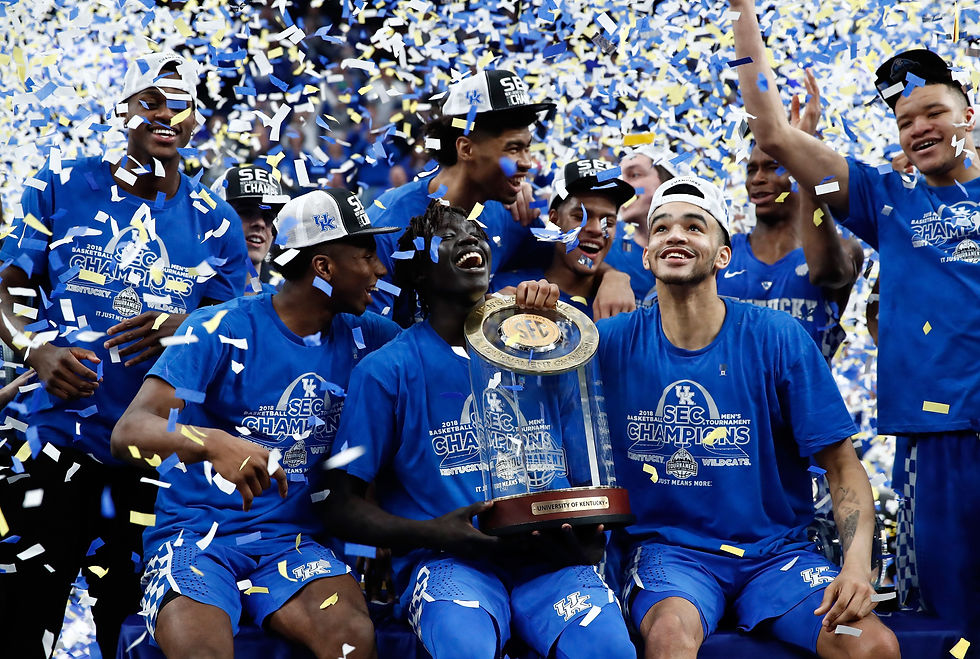What could name, image and likeness legislation for student athletes look like in KY?
- Game Changer

- Nov 15, 2021
- 3 min read
Updated: Nov 21, 2021

By Monica Kast | Lexington Herald Leader
During a meeting of the interim joint committee on education held Monday, representatives from universities in Kentucky discussed what potential legislation for name, image and likeness use for student athletes could look like.
State Sen. Max Wise, co-chair of the interim joint committee on education, said there is currently no legislation in Kentucky related to NIL. Monday’s discussions were surrounding a draft legislation put together by employees at the University of Louisville and the University of Kentucky, and shared with other schools in the state.
Currently, student athletes in Kentucky are able to make money from NIL because of an executive order that was signed this summer.
The draft legislation that was discussed Monday has three main goals, said Angela Curry, general counsel and vice president for legal affairs at the University of Louisville. The draft:
Gives student athletes the opportunity to make money from their name, image and likeness.
Gives colleges and universities the ability to put reasonable restrictions on NIL.
Gives colleges and universities immunity from potential lawsuits related to NIL.
There could also be an emphasis on educating student athletes about contracts, negotiations and potential tax implications of contracts, which some schools have already begun doing, said William Thro, general counsel for the University of Kentucky.
For student athletes, the legislation could require any compensation from NIL to be equal to market value, meaning students would be fairly compensated. It could also provide protection for students in the event their eligibility is jeopardized by NIL compensation, and also allows universities to consider NIL compensation for needs-based scholarships and awards, Curry said.
The proposal also includes the ability for universities to create their own restrictions around NIL for student athletes. Restrictions would not necessarily be statewide, but could vary from school to school, Thro said.
“One of the key things for the universities is we have to have the flexibility to impose reasonable restrictions, and rather than delineating all the restrictions that we thought would be reasonable, and then perhaps having to come back every year to add restrictions or tweak restrictions, we propose simply saying the universities may adopt whatever restrictions that they believe are reasonable, as long as they are in writing,” Thro said.
Reasonable restrictions could include things like students being required to disclose a NIL contract to their university or NIL activities not being allowed to interfere with the students’ participation in team activities. It could also include a provision that requires students to get permission before using any trademarks owned by the university, Thro said.
The third thing that could potentially be included is immunity for universities related to NIL, meaning they could not be sued for certain things related to NIL. However, that would not take away the students’ ability to seek legal action if they enter into a contract with a company, and the company breaks the contract, Thro said.
There was also discussion around requirements for universities to provide education for students who enter into a NIL contract. Rachel Baker, executive associate athletics director for compliance at UK, said schools in the state, including UK, have already begun doing this. Doing so would help students better understand their contracts and earnings, Baker said.
“That’s really where we’ve spent a lot of our time, is trying to provide financial literacy resources, helping students understand what exclusivity is in contracts ... helping them understand the tax implications and then building their brand as well,” Baker said.
Matt Banker, associate athletic director at U of L, said education has also been a priority surrounding NIL. The school has created a law clinic with law school and business school faculty to assist students who may deal with complicated legal issues surrounding NIL.
“Educating and empowering our student athletes has been our priority at the University of Louisville,” Banker said.




Comments